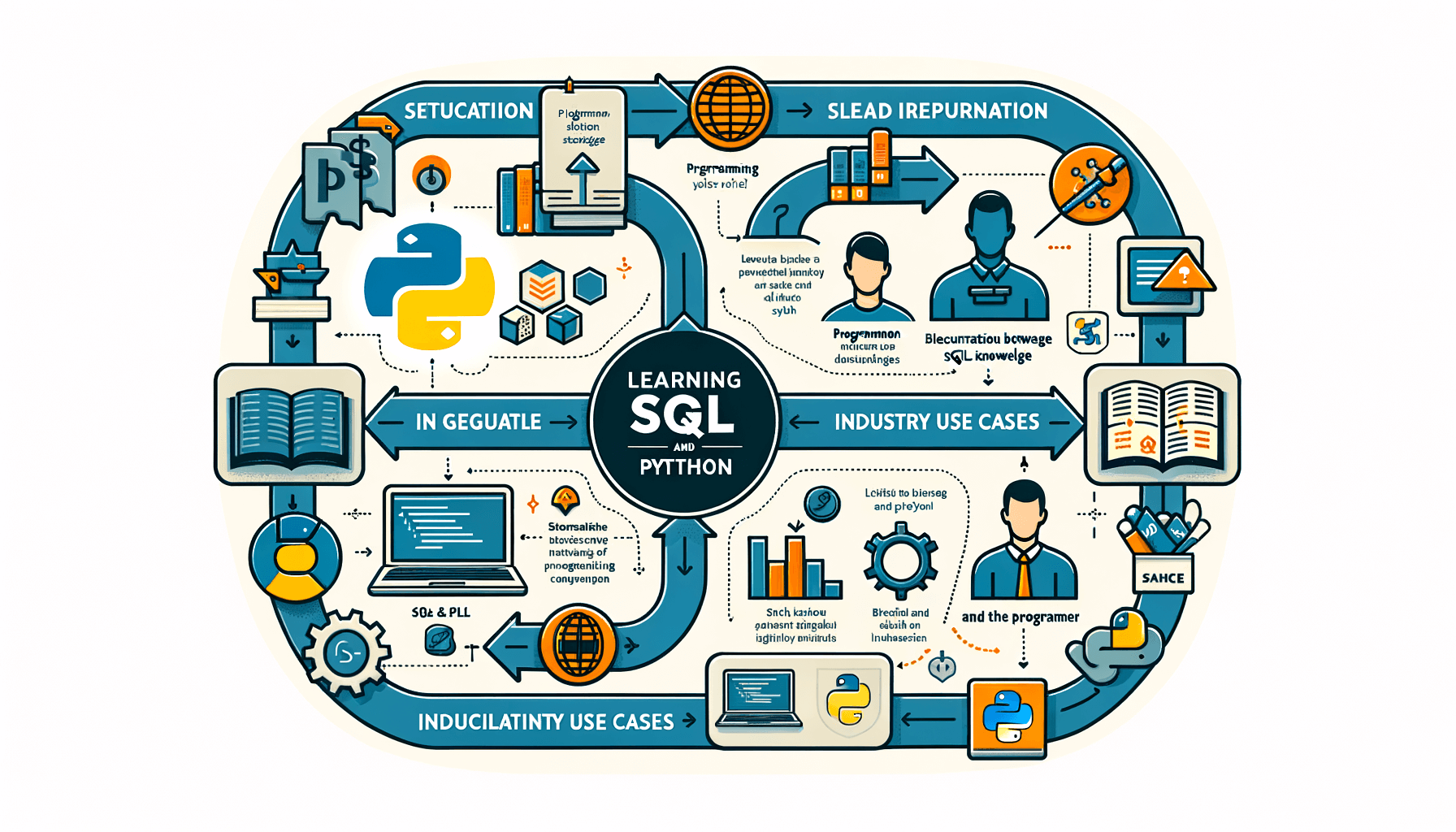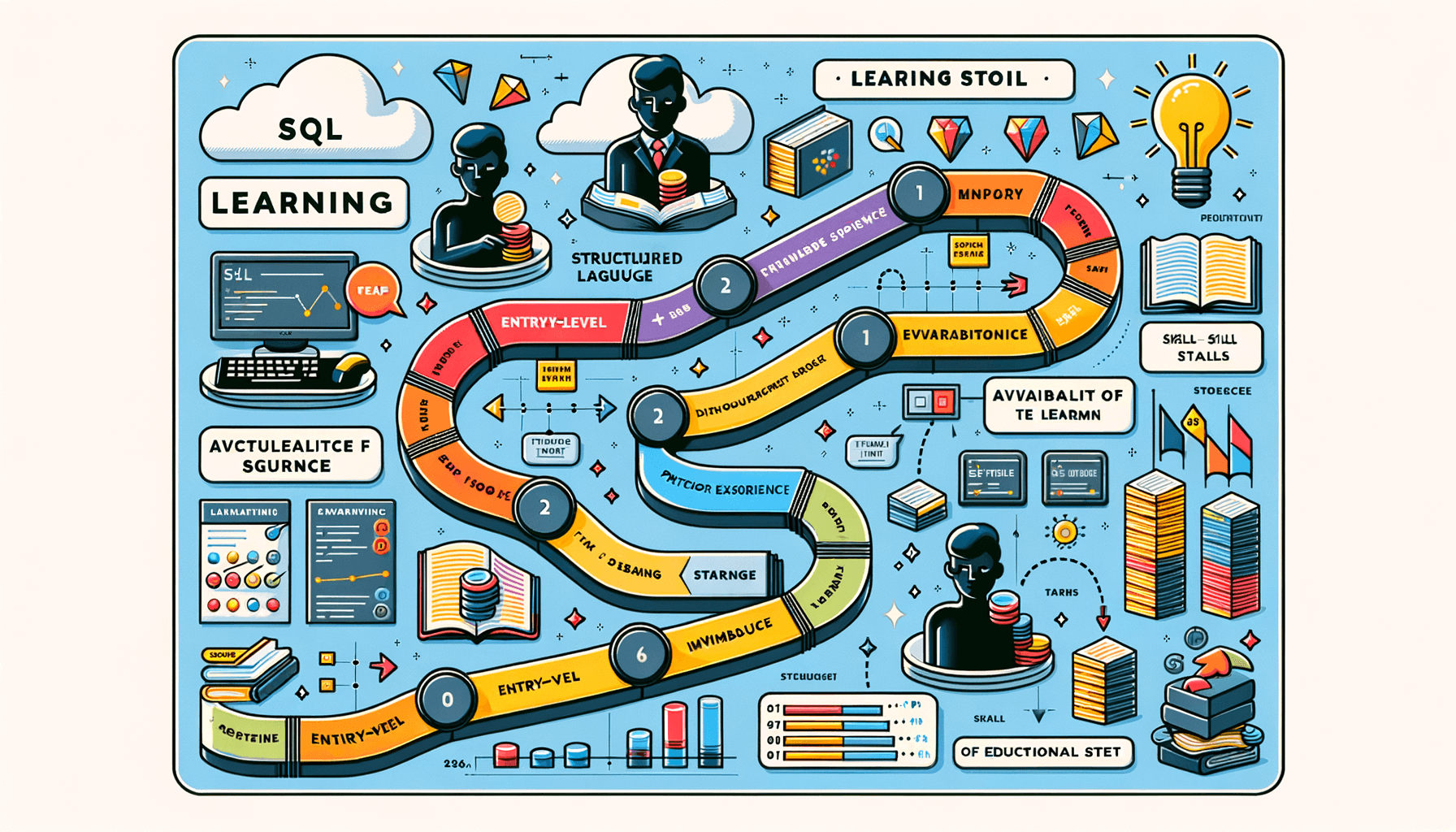A big variety of articles and resources

Do I still need to learn SQL if I already know Python?
 Sia Author and Instructor
Learn SQL
Sia Author and Instructor
Learn SQL
13 minute read
In today's world, data is everywhere. If you work with data, you might wonder if learning SQL is still worth it when you already know Python. This article will help you understand the roles of SQL and Python in data management. We'll look at how they compare, how they work together, and what you need to know to get the best out of both.
Key Takeaways
- SQL is still important for managing and querying databases.
- Python is great for data analysis, manipulation, and visualization.
- Using SQL and Python together can make your data work easier and more powerful.
- Learning SQL doesn't take much time and can boost your skills.
- Both SQL and Python have strong community support and many learning resources.
The Role of SQL in Data Management
Historical Context of SQL
SQL, or Structured Query Language, has been a cornerstone in data management since its inception in the 1970s. It was developed to provide a standardized way to interact with databases. Over the years, SQL has evolved, but its core principles remain the same. This consistency has made it a reliable tool for managing data across various industries.
SQL in Modern Data Systems
In today's data-driven world, SQL continues to play a crucial role. Modern data systems, including relational databases like MySQL and PostgreSQL, rely heavily on SQL for data manipulation and retrieval. Its ability to handle large volumes of data efficiently makes it indispensable in many applications, from web development to business intelligence.
Comparative Analysis with Other Data Management Tools
When compared to other data management tools, SQL stands out for its simplicity and effectiveness. While NoSQL databases and other technologies have their advantages, SQL's structured approach offers a level of precision and control that is hard to match. This makes it a preferred choice for tasks that require complex queries and data integrity.
SQL's enduring relevance in data management is a testament to its robust design and adaptability. From its early days to its current applications, SQL has proven to be a versatile and powerful tool.
Python's Capabilities in Data Handling
Data Manipulation Libraries in Python
Python offers a variety of libraries for data manipulation, making it a powerful tool for handling data. Libraries like Pandas and NumPy allow us to perform complex data operations with ease. Pandas, for instance, provides data structures and functions needed to manipulate structured data seamlessly. NumPy, on the other hand, is excellent for numerical data and mathematical operations.
Python for Data Analysis
When it comes to data analysis, Python stands out due to its simplicity and efficiency. We can use libraries like SciPy and StatsModels to perform statistical analysis. These libraries offer a wide range of statistical tests and models, making it easier to analyze data and draw meaningful conclusions. Additionally, Python's integration with Jupyter Notebooks allows us to document our analysis process interactively.
Python for Data Visualization
Data visualization is another area where Python excels. Libraries such as Matplotlib, Seaborn, and Plotly enable us to create a variety of visualizations, from simple line plots to complex interactive charts. These visualizations help in understanding data patterns and trends. Seaborn, for example, is built on top of Matplotlib and provides a high-level interface for drawing attractive statistical graphics.
Python's versatility in data handling makes it an essential tool for data scientists and analysts. Its extensive libraries and ease of use allow us to manipulate, analyze, and visualize data effectively.
Integration of SQL and Python
Using SQLAlchemy for Database Interaction
When we need to interact with databases in Python, SQLAlchemy is a powerful tool. It allows us to use Python code to manage and query databases, making it easier to work with data. SQLAlchemy bridges the gap between SQL and Python, letting us use the strengths of both.
Pandas and SQL Integration
Pandas, a popular data manipulation library in Python, can easily integrate with SQL databases. This means we can pull data from a database directly into a Pandas DataFrame, making data analysis more straightforward. This integration is especially useful for those who are familiar with Python but need to work with SQL databases.
Real-world Applications of SQL and Python Together
In real-world scenarios, combining SQL and Python can be very powerful. For example, we can use SQL to extract data from a database and then use Python to analyze and visualize that data. This combination is often used in fields like data science and business intelligence.
The synergy between SQL and Python allows us to leverage the strengths of both languages, making data management and analysis more efficient and effective.
Performance Considerations
Query Optimization in SQL
When it comes to managing data, query optimization in SQL is crucial. SQL databases have built-in tools that help speed up data retrieval. These tools can make a big difference in how fast you get your results. For example, using indexes can make searches much quicker. It's like having a well-organized library where you can find books easily.
Performance Benchmarks: SQL vs Python
Comparing SQL and Python for data tasks shows that each has its strengths. SQL is often faster for complex queries because it's designed for that purpose. On the other hand, Python is more flexible and can handle a variety of tasks. Here's a simple table to show the differences:
| Task | SQL | Python |
|---|---|---|
| Complex Queries | Fast | Moderate |
| Data Manipulation | Moderate | Fast |
| Flexibility | Low | High |
Scalability Issues
Scalability is another important factor. SQL databases are great for handling large amounts of data. They can grow with your needs. However, Python can also scale well, especially when used with the right tools. For example, using libraries like Pandas can help manage large datasets efficiently.
In summary, both SQL and Python have their own strengths and weaknesses. Understanding these can help you choose the right tool for the job.
Learning Curve and Skill Development
Time Investment for Learning SQL
Learning SQL can be a time-consuming process, especially for those who are new to programming. However, the investment is often worth it. Mastering SQL basics can open doors to many opportunities in data management and analysis. Websites like sqlskillz.com vs w3schools.com offer excellent resources for beginners to learn at their own pace.
Learning Resources for SQL and Python
There are numerous resources available for learning both SQL and Python. Online platforms, books, and courses provide comprehensive guides. For SQL, websites like sqlskillz.com vs w3schools.com are perfect for beginners. For Python, platforms like Coursera and edX offer in-depth courses. The key is to find resources that match your learning style and pace.
Skill Synergy: SQL and Python Together
Combining SQL and Python skills can significantly enhance your data handling capabilities. While SQL is excellent for querying and managing databases, Python excels in data manipulation and analysis. Together, they form a powerful toolkit for any data professional. The synergy between these two skills can lead to more efficient and effective data solutions.
Investing time in learning both SQL and Python can provide a competitive edge in the data industry. The combination of these skills is highly valued and can lead to numerous career opportunities.
Use Cases in Industry
SQL in Business Intelligence
SQL is a cornerstone in business intelligence. It helps us extract and analyze data from large databases. This is crucial for making informed decisions. Many companies rely on SQL to generate reports and dashboards that provide insights into their operations. The Zero to MySQL Junior DBA course offers practical SQL training with real-world problem-solving. Instructor Eric Vanier provides expertise in MySQL performance optimization and data management.
Python in Machine Learning
Python is widely used in machine learning. Its libraries, like TensorFlow and scikit-learn, make it easier to build and train models. Python's simplicity and readability allow us to focus on solving problems rather than writing complex code. This makes it a popular choice for both beginners and experts in the field.
Combined Use in Data Engineering
Combining SQL and Python can be very powerful in data engineering. SQL is great for querying and managing data, while Python excels in data manipulation and analysis. Together, they enable us to handle end-to-end data workflows efficiently. For example, we can use SQL to extract data from a database and then use Python to clean and analyze it. This combination is often used in real-world applications to solve complex data problems.
Community and Ecosystem Support
Open Source Contributions
Both SQL and Python have strong open-source communities. These communities constantly improve the tools and add new features. This makes both languages very reliable and up-to-date. For example, PostgreSQL and MySQL are popular open-source SQL databases, while Python has libraries like Pandas and NumPy.
Community Forums and Support
When learning or troubleshooting, community forums are invaluable. Websites like Stack Overflow and GitHub have active users who can help solve problems quickly. This support system makes it easier to learn and use both SQL and Python.
Industry Adoption
Many industries use SQL and Python, from finance to healthcare. Companies often look for employees who know both. This widespread use means there are many job opportunities for people skilled in these languages.
The strong community and industry support for SQL and Python make them essential tools for anyone working with data.
Security Implications
Data Security in SQL
When it comes to data security, SQL databases have a long history of being reliable. They offer features like encryption, access controls, and regular audits to keep data safe. These features are essential for protecting sensitive information. For example, many elearning services offer professional training programs with advanced security features.
Security Practices in Python
Python, on the other hand, is flexible and can be used to build secure applications. However, the security of a Python application often depends on the developer's skills. It's crucial to follow best practices like using secure libraries, validating inputs, and keeping dependencies up to date.
Combined Security Strategies
Combining SQL and Python can offer a robust security framework. SQL can handle data storage securely, while Python can manage secure data processing. Together, they can create a system that is both efficient and secure. This combination is particularly useful in applications that require both data management and complex computations.
In summary, understanding the security features of both SQL and Python can help us build more secure applications. This knowledge is invaluable for anyone looking to work in data management or software development.
Future Trends in Data Management
Evolving Standards in SQL
As we look ahead, SQL continues to evolve, adapting to the changing needs of data management. New standards are being developed to enhance its capabilities, making it more efficient and versatile. These advancements ensure that SQL remains a vital tool in the data management landscape.
Emerging Python Libraries
Python is also keeping pace with the evolving data management field. New libraries are emerging, offering more powerful tools for data analysis, manipulation, and visualization. These libraries are designed to work seamlessly with existing Python frameworks, providing a robust ecosystem for data professionals.
Predictions for Combined Use
The integration of SQL and Python is expected to become even more prevalent in the future. This combination leverages the strengths of both languages, offering a powerful solution for data management. We anticipate that more tools and frameworks will be developed to facilitate this integration, making it easier for data professionals to harness the full potential of both SQL and Python.
As we move forward, the synergy between SQL and Python will play a crucial role in shaping the future of data management. This combined approach will enable more efficient and effective data handling, driving innovation and progress in the field.
Cost and Resource Allocation
Infrastructure Costs
When we think about the costs of using SQL and Python, we need to consider the infrastructure. SQL databases often need dedicated servers, which can be expensive. On the other hand, Python scripts can run on less powerful machines. This can save money if we don't need high performance.
Human Resource Allocation
Learning SQL basics at your own pace is possible, but it takes time. We need to think about the time and effort our team will spend mastering PostgreSQL performance and query optimization. Python is often easier to learn, but both skills are valuable. We should plan our training programs carefully.
Cost-Benefit Analysis
We should look at the benefits of using both SQL and Python. SQL is great for managing large amounts of data quickly. Python is good for data analysis and visualization. By using both, we can get the best of both worlds. This combined approach can be more cost-effective in the long run.
Balancing the costs and benefits of SQL and Python can help us make better decisions for our projects. We need to think about both the short-term and long-term impacts on our budget and resources.
Managing costs and resources effectively is crucial for any project. By allocating resources wisely, you can save both time and money. Want to learn more about how to optimize your resource allocation? Visit our website today and discover our expert tips and courses!
Conclusion
In summary, knowing Python is a great skill, but learning SQL can still be very useful. Python is good for many tasks, but SQL is better for working with databases. SQL makes it easy to get and change data quickly. While Python can do some of this, SQL is made just for these jobs. So, even if you are good at Python, learning SQL can make you even better at handling data. It can open up more job chances and make your work easier. In the end, both Python and SQL are important tools for anyone who works with data.
Frequently Asked Questions
Do I need to learn SQL if I already know Python?
Yes, learning SQL is still important even if you know Python. SQL is specifically designed for managing and querying databases, which is a crucial skill in data management.
Can Python replace SQL for database management?
While Python is powerful and can handle many tasks, it is not a replacement for SQL when it comes to database management. SQL is optimized for these operations and is often more efficient.
How long does it take to learn SQL?
The time it takes to learn SQL can vary, but many people can get a good grasp of the basics in a few weeks with consistent practice.
What are the best resources to learn SQL?
There are many resources available to learn SQL, including online courses, tutorials, and books. Websites like Khan Academy, Coursera, and Codecademy offer great courses for beginners.
How do SQL and Python work together?
SQL and Python can work together by using libraries like SQLAlchemy and Pandas. These tools allow you to interact with databases and perform data analysis seamlessly.
Is SQL used in machine learning?
Yes, SQL is often used in the data preprocessing stage of machine learning. It helps in retrieving and preparing data from databases before using it in machine learning models.
What industries use SQL and Python?
SQL and Python are used in many industries, including finance, healthcare, retail, and tech. They are essential tools for data analysis, business intelligence, and data engineering.
Are there any security concerns with using SQL and Python?
Yes, there are security concerns with using both SQL and Python. It's important to follow best practices, such as using parameterized queries in SQL and securing Python code, to protect data.
Related Articles

Can a programmer master SQL in a week?
13 minute read

How did you learn SQL? Did you have a teacher?
14 minute read

How Long It Takes to Learn SQL: A Comprehensive Guide
10 minute read




